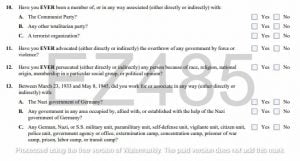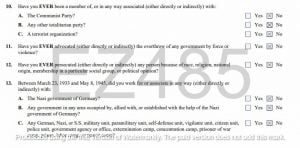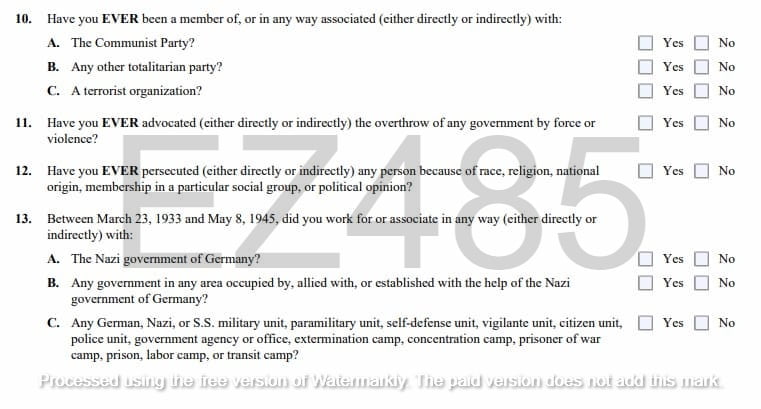Demystifying Part 12 of the N-400 Form: Additional Information About You (Person Applying for Naturalization) (2)
Introduction
The path to U.S. citizenship involves navigating a series of forms and requirements, and the Form N-400, Application for Naturalization, is a crucial step in the journey. Within this comprehensive application, Part 12 stands out as it seeks “Additional Information About You (Person Applying for Naturalization).” This section includes several questions (items 10 to 14) that require specific information and, in some cases, additional explanations. In this article, we’ll delve into the details of Part 12, covering the questions and providing insights to help applicants complete this section accurately.
Part 12: Additional Information About You
Part 12 of the N-400 form is a critical component of your naturalization application. It seeks to gather essential background information about the applicant. The questions in this section are designed to ensure that applicants meet the legal requirements for naturalization and do not have affiliations or histories that might compromise national security or contradict the values of the United States.
Let’s explore the specific questions in Part 12 and their significance:


Item 10: Associations and Advocacy
10. Have you EVER been a member of, or in any way associated (either directly or indirectly) with:
10A. The Communist Party? No
10B. Any other totalitarian party? No
10C. A terrorist organization? No
Question 10A to 10C focuses on an applicant’s associations and affiliations, particularly with organizations that may have ideologies or activities that are not in line with U.S. values. Answering these questions accurately is crucial to demonstrate alignment with U.S. ideals.
11. Have you EVER advocated (either directly or indirectly) the overthrow of any government by force or violence? No
Question 11 delves into an applicant’s history of advocating for the overthrow of a government using force or violence. This question is posed to ensure that applicants have not been involved in activities that contradict the principles of a peaceful and law-abiding society.
12. Have you EVER persecuted (either directly or indirectly) any person because of race, religion, national origin, membership in a particular social group, or political opinion? No
Question 12 is vital to determine if an applicant has been involved in the persecution of individuals based on race, religion, nationality, social group, or political beliefs. The United States values the principles of equality and non-discrimination, and this question is designed to assess the applicant’s alignment with these values.
Item 13: Historical Associations
13. Between March 23, 1933 and May 8, 1945, did you work for or associate in any way (either directly or indirectly) with:
13A. The Nazi government of Germany? No
13B. Any government in any area occupied by, allied with, or established with the help of the Nazi government of Germany? No
13C. Any German, Nazi, or S.S. military unit, paramilitary unit, self-defense unit, vigilante unit, citizen unit, police unit, government agency or office, extermination camp, concentration camp, prisoner of war camp, prison, labor camp, or transit camp? No
Question 13A to 13C is a historical assessment that looks into an applicant’s associations during a specific period in history. These questions are critical to ensure that the applicant’s history does not include involvement with entities or activities associated with the atrocities of World War II.
Item 14: Involvement in Serious Offenses
14. Were you EVER involved in any way with any of the following:
14A. Genocide? No
14B. Torture? No
14C. Killing, or trying to kill, someone? No
14D. Badly hurting, or trying to hurt, a person on purpose? No
14E. Forcing, or trying to force, someone to have any kind of sexual contact or relations? No
14F. Not letting someone practice his or her religion? No
Question 14 delves into an applicant’s history regarding involvement in serious offenses. These questions are designed to ensure that applicants have not participated in activities that are considered heinous crimes, such as genocide, torture, killing, or other severe actions that contravene U.S. laws and values.
Illustrating the Answers: Using a Sample Persona
To provide a practical understanding of how to answer the questions in Part 12 of the N-400 form, we’ll introduce a fictional persona, Maria da Silva, from Brazil. Maria’s background and responses to these questions will serve as a useful example for applicants to follow.


Maria’s Profile:
- Name: Maria da Silva
- Country of Origin: Brazil
- Current Residence: New York, NY
Sample Responses to Questions in Part 12:
- Have you EVER been a member of, or in any way associated (either directly or indirectly) with:
- 10A. The Communist Party? No
- 10B. Any other totalitarian party? No
- 10C. A terrorist organization? No
- Have you EVER advocated (either directly or indirectly) the overthrow of any government by force or violence? No
- Have you EVER persecuted (either directly or indirectly) any person because of race, religion, national origin, membership in a particular social group, or political opinion? No
- Between March 23, 1933 and May 8, 1945, did you work for or associate in any way (either directly or indirectly) with:
- 13A. The Nazi government of Germany? No
- 13B. Any government in any area occupied by, allied with, or established with the help of the Nazi government of Germany? No
- 13C. Any German, Nazi, or S.S. military unit, paramilitary unit, self-defense unit, vigilante unit, citizen unit, police unit, government agency or office, extermination camp, concentration camp, prisoner of war camp, prison, labor camp, or transit camp? No
- Were you EVER involved in any way with any of the following:
- 14A. Genocide? No
- 14B. Torture? No
- 14C. Killing, or trying to kill, someone? No
- 14D. Badly hurting, or trying to hurt, a person on purpose? No
- 14E. Forcing, or trying to force, someone to have any kind of sexual contact or relations? No
- 14F. Not letting someone practice his or her religion? No
Maria’s sample responses help illustrate how applicants should approach these questions honestly and in alignment with their own backgrounds. If there are affirmative responses to any of these questions, applicants should be prepared to provide detailed explanations.
Where to File Your Form N-400
The process of filing your Form N-400 involves two primary methods: online submission or mailing a paper application. Here’s what you need to know about each option:
Filing Your Form N-400 Online:
- To file your Form N-400 online, you must create a USCIS online account. Having an online account offers several advantages, including:
- Paying your filing fee online.
- Checking the status of your case.
- Receiving notifications and case updates.
- Viewing personalized case completion date estimates.
- Responding to requests for evidence.
- Managing your contact information, including updating your address.
Attorneys and Accredited Representatives: If you are an attorney or an accredited representative, you can create an online account that allows you to manage all of your clients’ applications in one place.
Filing Your Form N-400 by Mail:
- If you choose to submit Form N-400 on paper, USCIS will send you a USCIS Account Acceptance Notice with instructions on how to create an online account to track and manage your case. While you can opt not to create an online account, it is encouraged to do so to access case updates and notifications efficiently.
Important Note: Ensure that you mail your application to the appropriate direct filing address, as applications sent to the wrong address may experience processing delays.
For specific mailing instructions, please visit USCIS’s Direct Filing Addresses for Form N-400 page. This will provide you with the necessary details on where to mail your application.
Conclusion
As we conclude our exploration of Part 12 of the N-400 form, it’s essential to underscore the significance of answering these questions accurately. The information you provide in this section plays a pivotal role in the naturalization process. Honesty is the foundation of a successful application, and any affirmative answers should be accompanied by typed or printed explanations on additional sheets of paper. This is the path to demonstrate your eligibility for U.S. citizenship.
The questions in Part 12 are designed to ensure that applicants meet the legal requirements for naturalization, uphold the values of the United States, and have not been involved in activities that compromise national security. Your candor and accuracy in completing this section are vital.
For those embarking on the journey to U.S. citizenship, it’s essential to use the correct edition of the Form N-400, with the edition date mentioned in this article being 09/17/19. All pages of the form should adhere to this edition and required formatting to avoid potential issues with your application.
Additionally, applicants have two options for filing the Form N-400: online submission and mailing a paper application. Creating an online account with USCIS offers several advantages, including efficient case tracking and management.
In closing, the naturalization process may appear complex, but with attention to detail and adherence to the provided guidelines, you can successfully navigate it. Your commitment to honesty and accuracy in answering the questions in Part 12 and your choice of the correct filing method will bring you one step closer to achieving your dream of U.S. citizenship.
Remember that this article provides a general understanding of Part 12 of the N-400 form and the filing options available. For specific guidance and up-to-date information, please refer to the official USCIS website or consult with immigration experts.
[Note: The edition date for the N-400 form mentioned in this article is 09/17/19, and it’s crucial to ensure that all pages of the form adhere to this edition and formatting requirements.]
